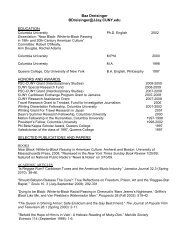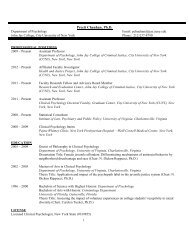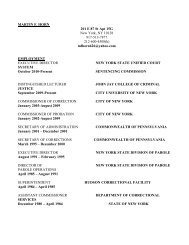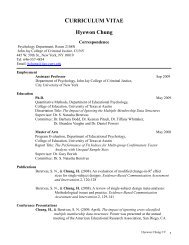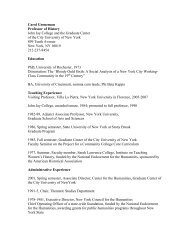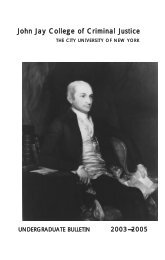Bulletin - John Jay College Of Criminal Justice - CUNY
Bulletin - John Jay College Of Criminal Justice - CUNY
Bulletin - John Jay College Of Criminal Justice - CUNY
Create successful ePaper yourself
Turn your PDF publications into a flip-book with our unique Google optimized e-Paper software.
APPENDIX<br />
D. Procedures In Cases In Which Both A Disciplinary And<br />
An Academic Sanction Are Sought<br />
If a faculty member or the college seeks to have both a disciplinary<br />
and an academic sanction imposed, it is not advisable to proceed on<br />
both fronts simultaneously lest inconsistent results ensue. Thus, it is<br />
best to begin with the disciplinary proceeding seeking imposition of a<br />
disciplinary sanction and await its outcome before addressing the<br />
academic sanction. If the Faculty-Student Disciplinary Committee<br />
finds that the alleged violation occurred, then the faculty member<br />
may reflect that finding in the student’s grade. If the Faculty-Student<br />
Disciplinary Committee finds that the alleged violation did not occur,<br />
then no sanction of any kind may be imposed. The decision whether<br />
to pursue both kinds of sanctions will ordinarily rest with the faculty<br />
member.<br />
E. Reporting Requirements<br />
1. By The Faculty Member To The Academic Integrity <strong>Of</strong>ficial<br />
In cases where a violation of academic integrity has been found to<br />
have occurred (whether by admission or a fact-finding process), the<br />
faculty member should promptly file with the Academic Integrity<br />
<strong>Of</strong>ficial a report of the adjudication in writing on a Faculty Report<br />
form provided by the college as described above. The Academic<br />
Integrity <strong>Of</strong>ficial shall maintain a confidential file for each student<br />
about whom a suspected or adjudicated violation is reported.<br />
If either the grade appeals process or the Faculty-Student<br />
Disciplinary Committee finds that no violation occurred, the<br />
Academic Integrity <strong>Of</strong>ficial shall remove and destroy all material<br />
relating to that incident from the student’s confidential academic<br />
integrity file. Before determining what sanction(s) to seek, the faculty<br />
member or the Academic Integrity <strong>Of</strong>ficial may consult the student’s<br />
confidential academic integrity file, if any, to determine whether the<br />
student has been found to have previously committed a violation of<br />
the Academic Integrity Policy, the nature of the infraction, and the<br />
sanction imposed or action taken.<br />
2. By the Academic Integrity <strong>Of</strong>ficial To the Faculty Member<br />
Where a matter proceeds to the Faculty-Student Disciplinary<br />
Committee, the Academic Integrity <strong>Of</strong>ficial shall promptly report its<br />
resolution to the faculty member and file a record of the resolution in<br />
the student’s confidential academic integrity file, unless, as indicated<br />
above, the suspected violation was held to be unfounded, in which<br />
case all reporting forms concerning that suspected violation shall be<br />
destroyed.<br />
ADOPTED BY THE BOARD OF TRUSTEES ON JUNE 28, 2004.<br />
THE CITY UNIVERSITY OF NEW YORK<br />
COMPUTER USER RESPONSIBILITIES<br />
NOTE: The City University of New York Computer User<br />
Responsibilities is a statement originally prepared by the University’s<br />
Faculty Senate and the <strong>CUNY</strong> <strong>Of</strong>fice of the Vice Chancellor of Legal<br />
Affairs.<br />
The computer resources** of The City University of New York must<br />
be used in a manner that is consistent with the University’s<br />
educational purposes and environment. All users of computer<br />
resources are expected to act in a spirit of mutual respect and<br />
cooperation, and to adhere to the regulations for their use set forth in<br />
this document. As a user of <strong>CUNY</strong> computer resources:<br />
• You must have a valid authorized account to use computer<br />
resources that require one and may use only those computer<br />
resources that are specifically authorized. You may use your<br />
account only in accordance with its authorized purposes and<br />
may not use an unauthorized account for any purpose.<br />
• You are responsible for the safeguarding of your computer<br />
account. For a mainframe computer account, you should change<br />
your password frequently and should not disclose it to anyone.<br />
You should take all necessary precautions in protecting the<br />
account, no matter what type of computer resources you are<br />
using.<br />
313



